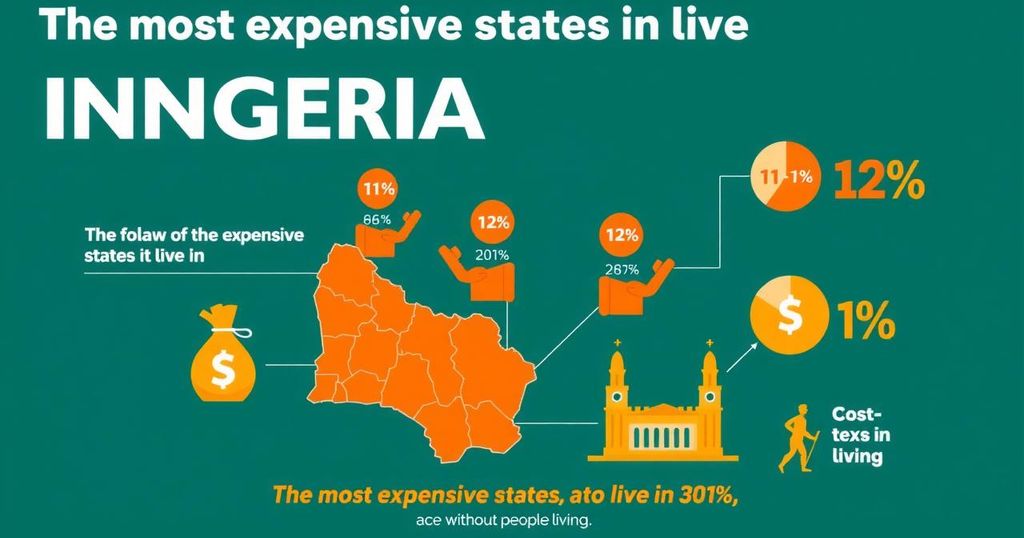Borno, Niger, and Eight Others Rank as Nigeria’s Most Expensive States
A recent report by the National Bureau of Statistics reveals Borno as the most expensive state in Nigeria, driven by high inflation rates, particularly in food prices. Nine additional states also show significant inflation figures, with challenges stemming from insecurity and supply disruptions. Overall, investment from the Central Bank may be vital to address these state-specific economic pressures.
The latest National Bureau of Statistics data reveals that Borno state, alongside nine others, ranks among the most expensive places to reside in Nigeria, reflecting a harsh economic reality for many. As of May 2025, the inflation rate has had some fluctuations, showing an overall easing but with several states experiencing alarming figures. Notably, 10 states have inflation rates surpassing 25.9%, with four of those exceeding a staggering 30%.
Although the national headline inflation decreased to 22.97% in May from 24.23% in March, local conditions vary significantly across different states. This is the second consecutive month of decline, a notable drop from the 33.95% recorded last year. However, food prices remain a significant issue, illustrating the complexity of Nigeria’s economic landscape. According to the NBS report, food inflation is at 21.14%, a stark improvement from 40.66% in May 2024, though month-on-month food inflation ticked back up slightly.
Borno state tops the list with an all-items inflation rate hitting 38.9% and food inflation soaring to 64.4%, exacerbated by local conflicts and the displacement of farming communities. The state has become the most expensive in Nigeria largely due to its unique security challenges limiting agricultural productivity. Niger state follows closely in second place with 35% all-items inflation, reflecting ongoing transport and supply chain hurdles, further driven by insecurity in the region.
Plateau state ranks third at 32.3% in headline inflation, indicating a complex situation where some components like transportation costs are increasing, even though food prices showed deflation. Abuja, the Federal Capital Territory, is fourth with a headline inflation rate of 31.1%, largely influenced by a sharp month-on-month increase in food prices.
In the Southwest region, Oyo state has a headline inflation of 28.9%. Although there has been some improvement in food access, the high cost of living persists due to various economic pressures. Nasarawa state’s situation is also concerning, listing sixth with a 27.4% inflation rate, impacted by longstanding costs in energy and transport, despite stable food prices.
Taraba and Cross River states are next on the list, both suffering from significant food inflation rates due to agricultural challenges. Then, we see Edo state, which maintains a position among the most expensive states despite recent nominal declines in headline inflation but rising food costs. Rounding out the list, Benue state has seen various disruptions that continue to affect pricing, keeping its inflation cozy at 25%.
Earlier reports highlighted that as of April 2025, Enugu, Kebbi, and Niger states had taken the lead as the most costly states, signaling a shifting economic pattern through the year. Enugu, for instance, previously noted a staggering 36% headline inflation, showing just how dynamic and volatile the inflation situation is in Nigeria.
Reports from Legit.ng have provided vital insights into these economic trends, pointing out the necessity for the Central Bank of Nigeria to step in with initiatives to address these inflationary pressures across the board. The situation calls for urgent attention as many citizens grapple with a burdened cost of living.
In summary, the inflation trends show that Borno state currently experiences the highest cost of living in Nigeria, driven by intense food inflation and ongoing security issues. The report from the NBS indicates that inflation remains a critical issue for several states, necessitating potential interventions from the Central Bank to manage these economic challenges effectively. Overall, while some national improvements in inflation are noted, the local conditions tell a more complicated story, highlighting disparities across Nigeria.
Original Source: www.legit.ng




Post Comment